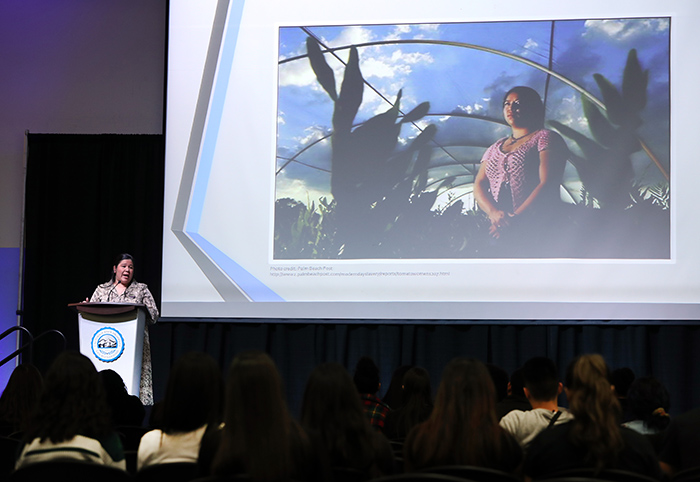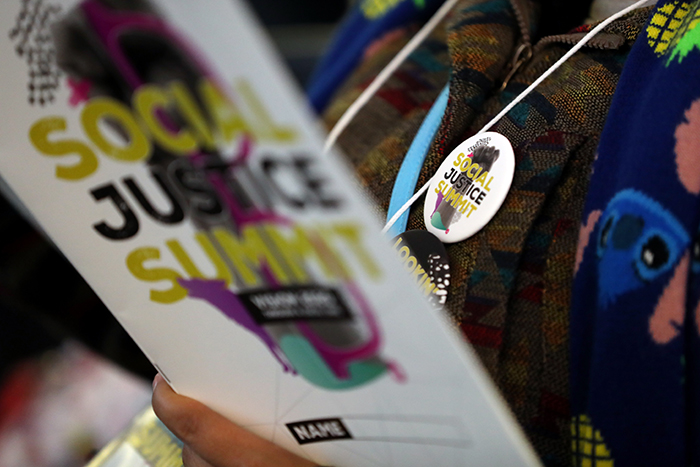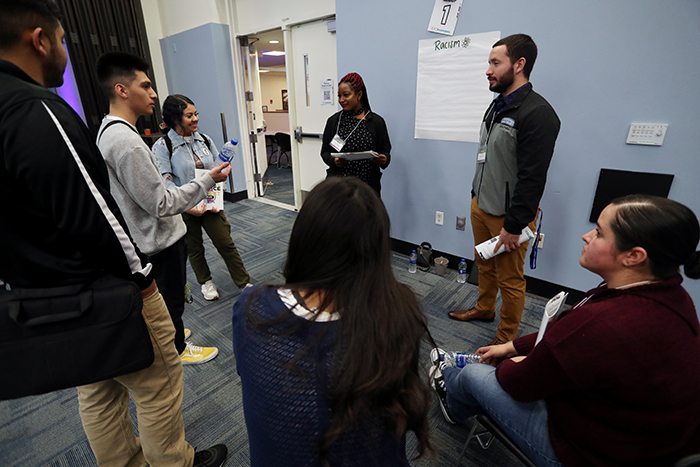Joe Gutierrez Office of Strategic Communication (909) 537-5007 joeg@csusb.edu

Mónica Ramírez, an activist, author, civil rights attorney, social entrepreneur and speaker, who helped spark the Time’s Up movement through a “Dear Sisters” letter published in Time Magazine, visited Cal State San Bernardino for the university’s annual Social Justice Summit, hosted by the Office of Student Engagement.
In her keynote presentation on Feb. 7, Ramírez talked about her experiences growing up as the daughter and granddaughter of migrant farmworkers, the sexual harassment that many farmworker women face, the anti-immigration climate in the country, and discussed some of the cases she worked on when she was a practicing attorney.
Ramírez credits her family and their work for inspiring her to become an activist, which she started when she was just 14 years old.
“My family used to crisscross the country, picking crops and spent a great deal of time in the Deep South picking cotton,” Ramírez said, “and it was that experience of living in the Deep South during the civil rights movement that really planted the seed for who I am as an activist and the work I’ve done over the course of my career.”
Ramírez also discussed the work of prominent LatinX and African American leaders, highlighting the ongoing, important partnership between the two communities.
“In this struggle to have better lives, the LatinX community has always been in community with the black community and have had the honor of walking along the side of black community members in our struggle for freedom, in our struggle for survival, and the betterment of this country,” she said.
“We’re living in dark times. We’re living in difficult times. We’re living in times where people are starting to feel hopeless and helpless. And I understand it because I’m on the frontlines with communities across this country and I meet with community members who feel like there is no way forward,” she said. “And if we don’t talk about the legacy of greatness that is part of our community and the work of social justice warriors, like Martin Luther King, Dolores Huerta, Rosa Parks and so many others, then there’s a danger. Their many contributions could be lost and could be erased.”
After talking about the many significant, well-known leaders, she highlighted some of the brave women who she has worked with – ones “we won’t hear about.”
“Most of my work over the course of my career as an attorney has been fighting for the rights of women who have been victims of sexual violence,” she said. “And across our country there are an estimated 2 to 3 million farmworkers in our nation, and now it’s estimated there are about 900,000 farmworker women in this country. And of the few studies that have been done, we understand that about 90 percent of the women who have been interviewed have said that sexual harassment is a workplace problem for them.”
With these kinds of issues running through the country, it is time for courage, Ramírez declared.
“If we want to live in a more just society, if we want to change the laws, if we want to make sure that no one is marginalized or othered or isolated, it’s on all of us … and it’s going to require every single thing that we have – all of our tools, all of our skills, all of our voices, all of our platforms.”
When Ramírez was board president of the Alianza Nacional de Campesinas (the National Farmworker Women’s Alliance), which she co-founded, she wrote a letter on behalf of Alianza members to lend support and solidarity to the women and men in Hollywood who came forward with their experiences of sexual harassment and assault in the wake of the Harvey Weinstein scandal. The letter went viral and helped spark Time’s Up, in which Ramírez remains an active member. In 2018, Ramírez attended the 75th Golden Globe Awards as a guest of Laura Dern.
“We write on behalf of the approximately 700,000 women who work in the agricultural fields and packing sheds across the United States,” the letter says, which was written in 2017. “For the past several weeks we have watched and listened with sadness as we have learned of the actors, models and other individuals who have come forward to speak out about the gender-based violence they’ve experienced at the hands of bosses, coworkers and other powerful people in the entertainment industry. We wish that we could say we’re shocked to learn that this is such a pervasive problem in your industry. Sadly, we’re not surprised because it’s a reality we know far too well.”
To learn more about the Time’s Up movement, visit the Time’s Up website at timesupnow.org.


